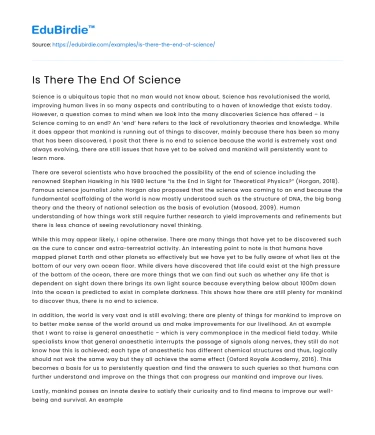Science is a ubiquitous topic that no man would not know about. Science has revolutionised the world, improving human lives in so many aspects and contributing to a haven of knowledge that exists today. However, a question comes to mind when we look into the many discoveries Science has offered – is Science coming to an end? An ‘end’ here refers to the lack of revolutionary theories and knowledge. While it does appear that mankind is running out of things to discover, mainly because there has been so many that has been discovered, I posit that there is no end to science because the world is extremely vast and always evolving, there are still issues that have yet to be solved and mankind will persistently want to learn more.
There are several scientists who have broached the possibility of the end of science including the renowned Stephen Hawking in his 1980 lecture “Is the End in Sight for Theoretical Physics?” (Horgan, 2018). Famous science journalist John Horgan also proposed that the science was coming to an end because the fundamental scaffolding of the world is now mostly understood such as the structure of DNA, the big bang theory and the theory of national selection as the basis of evolution (Masood, 2009). Human understanding of how things work still require further research to yield improvements and refinements but there is less chance of seeing revolutionary novel thinking.
Save your time!
We can take care of your essay
- Proper editing and formatting
- Free revision, title page, and bibliography
- Flexible prices and money-back guarantee
While this may appear likely, I opine otherwise. There are many things that have yet to be discovered such as the cure to cancer and extra-terrestrial activity. An interesting point to note is that humans have mapped planet Earth and other planets so effectively but we have yet to be fully aware of what lies at the bottom of our very own ocean floor. While divers have discovered that life could exist at the high pressure of the bottom of the ocean, there are more things that we can find out such as whether any life that is dependent on sight down there brings its own light source because everything below about 1000m down into the ocean is predicted to exist in complete darkness. This shows how there are still plenty for mankind to discover thus, there is no end to science.
In addition, the world is very vast and is still evolving; there are plenty of things for mankind to improve on to better make sense of the world around us and make improvements for our livelihood. An at example that I want to raise is general anaesthetic – which is very commonplace in the medical field today. While specialists know that general anaesthetic interrupts the passage of signals along nerves, they still do not know how this is achieved; each type of anaesthetic has different chemical structures and thus, logically should not wok the same way but they all achieve the same effect (Oxford Royale Academy, 2016). This becomes a basis for us to persistently question and find the answers to such queries so that humans can further understand and improve on the things that can progress our mankind and improve our lives.
Lastly, mankind posses an innate desire to satisfy their curiosity and to find means to improve our well-being and survival. An example would be human’s curiosity towards preventing ageing or slowing it down. Humans reasonably understand the processes that govern the ageing process and how we die. We are also aware that many diseases have age as a significant risk factor. Telomere shortening is associated and highly central to ageing. However, other organisms that do not age have demonstrated their ability to repair their telomeres throughout their lives (Oxford Royale Academy, 2016). Hence, this arouses humans’ curiosity and engenders the motivation to study and find out whether there are methods to slow down ageing which as aforementioned, is a significant risk factor of many illnesses. There is still ample for mankind to learn which all contribute to Science, impeding its supposed end.






 Stuck on your essay?
Stuck on your essay?

